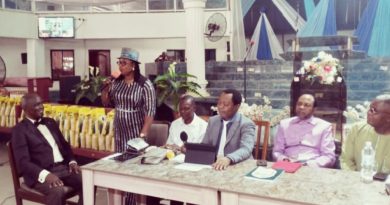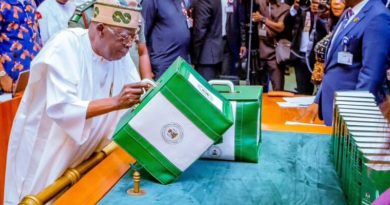HURIWA Calls for Transparency in N100 Billion School Feeding Allocation
Oru Leonard
The Human Rights Writers Association of Nigeria (HURIWA), has vehemently advocated for increased transparency and accountability following President Bola Tinubu’s announcement of a substantial N100 billion allocation for the school feeding program in the 2024 budget. The disclosure was made during the signing of the appropriation bill into law, where President Tinubu emphasized the program’s crucial role in encouraging school attendance and addressing malnutrition among students.
In a press release issued on Tuesday, HURIWA expressed concern over the recurring financial malfeasance within the Ministry of Humanitarian Affairs, Disaster Management, and Social Development, supervised by Sadiya Farouq, emphasizing the dire need for transparency and accountability in government programs, especially those targeting the welfare of vulnerable populations.
Stating that the 2024 budget, aptly named “Renewed Hope,” emphasizes a reduction in recurrent expenditure coupled with an increase in capital expenditure, HURIWA cautiously expressed optimism about the government’s commitment to prudent financial management. However, the association urged the government to learn from the lapses of previous school feeding initiatives, which were marred by financial irregularities and a lack of accountability.
Recalling the startling revelation by the Independent Corrupt Practices and Other Related Offences Commission (ICPC) in October 2020, exposing the diversion of N2.67 billion meant for the federal government’s school feeding program into private accounts, HURIWA highlighted concerns raised during the Covid-19 lockdown when the Ministry of Humanitarian Affairs, Disaster Management, and Social Development, under Sadiya Umar Farouk, claimed to have spent N600 billion when schools were closed due to the pandemic, raising questions about transparency and accountability regarding beneficiaries and fund utilization.
The press release, signed by the National Coordinator, Comrade Emmanuel Onwubiko, further expressed deep concern over the recurrent alleged financial malfeasance associated with erstwhile President Buhari’s Humanitarian Services ministry. “In November 2021, the House of Representatives Committee on Appropriations summoned the then Minister of Humanitarian Affairs, Disaster Management, and Social Development, Sadiya Farouq, for allegedly avoiding invitations to defend the 2022 budget. The committee insisted that the minister, not the Permanent Secretary, should be held accountable for the substantial spending on palliatives in the 2020 and 2021 budgets.”
As the new administration allocates N100 billion for the school feeding program in 2024, HURIWA urged caution and warned against the funds becoming a tool for political campaigns or a means of rewarding party loyalists. The association emphasized the need for a realistic yardstick in fund redistribution and called for a transparent process that avoids the pitfalls of previous initiatives.
Continuing, HURIWA criticized the use of Local Government Areas as distribution points, arguing that it empowers governors and compromises the scheme’s intended purpose, given the non-existence of a functional Local Government Area in line with constitutional provisions.
“Section 7 (1) of the constitution declares unequivocally that: “The system of local government by democratically elected local government councils is under this constitution guaranteed: and accordingly, the Government of every State shall ensure their existence under a law which provides for the establishment, structure, composition, finance, and functions of the council.” The association suggested involving traditional rulers and presidents of organized associations within autonomous communities, individuals with a deep understanding of local needs and communities.
Commending President Tinubu for deciding to transfer the implementation of the scheme from the Ministry of Humanitarian Affairs and Disaster Management to the Ministry of Education, HURIWA applauded this decision, acknowledging the historical challenges associated with the former ministry. The association called for collaboration between the Federal Ministry of Education and grassroots-level traditional institutions to ensure an effective and corruption-free implementation of the school feeding program.
“It is very thoughtful of President Bola Ahmed Tinubu, as the father of the nation, to have remembered the poor by allocating a significant chunk of money for them. However, this good intention may be wasted if he goes about it the wrong way. He should allow the Federal Ministry of Education to handle the scheme in collaboration with traditional institutions directly from the grassroots. These are the people that live with people, not Governors who do not stay in their state capitals.”
Acknowledging President Tinubu for taking on the challenge of addressing the educational and nutritional needs of the nation’s children, HURIWA urged him to learn from past mistakes, emphasizing the importance of transparency, accountability, and a people-centric approach in government initiatives. The association concluded by reaffirming its commitment to advocating for human rights, accountability, and good governance, urging the government to uphold these principles in the implementation of the school feeding program and other initiatives aimed at improving the lives of Nigerians.




